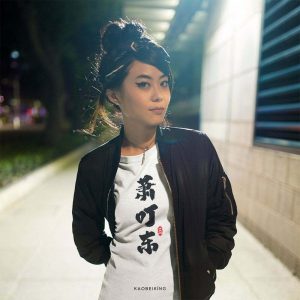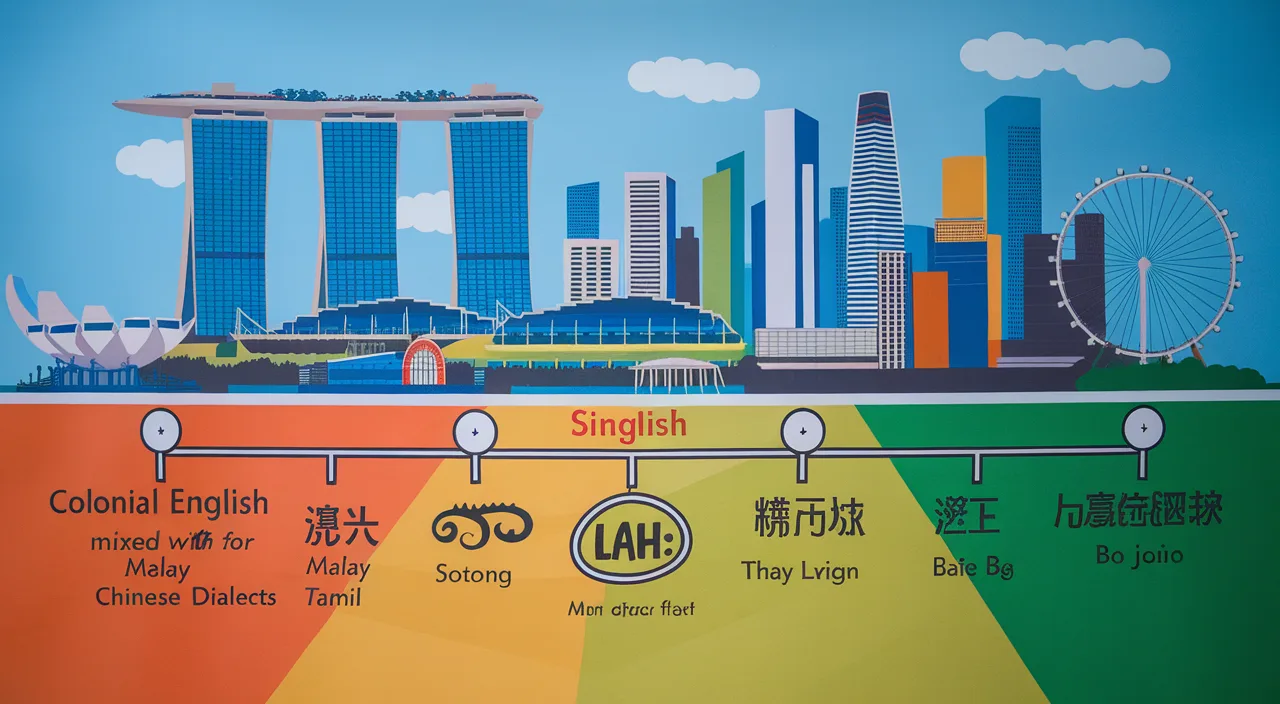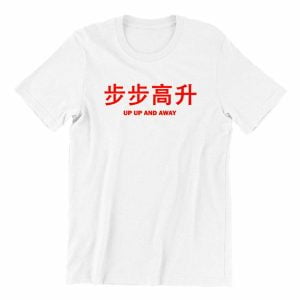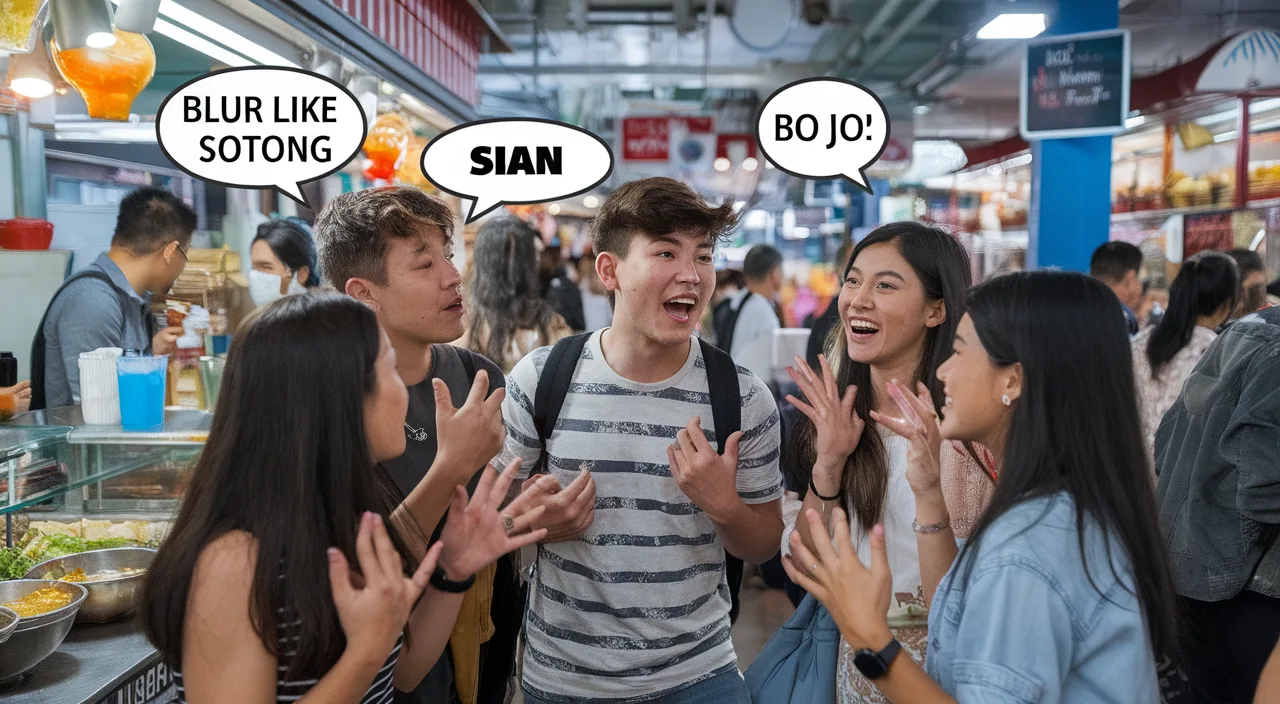Why is ‘blur like sotong’ so shiok to use in Singlish slang?
Because sometimes, calling someone ‘confused’ doesn’t cut it. You want drama. You want flavour. You want seafood metaphors that hit like sambal. That’s where ‘blur like sotong’ swoops in with all its uniquely Singaporean punch – a perfect example of how Singlish slang transforms ordinary expressions into cultural gold.
-
Chinese, KaoBeiKing, Quote, T-shirts, Typography
Price range: $30.00 through $38.00 Select options This product has multiple variants. The options may be chosen on the product page
TL;DR Summary
- ‘Blur like sotong’ is popular Singlish slang used to describe someone who’s confused, slow to catch on, or a bit lost.
- It reflects our linguistic diversity, borrowing charm from multiple ethnic and language influences that shape Singaporean culture.
- Beyond humor, colloquial expressions like this define our local identity and offer cultural shorthand we all recognise.
- This article explores the history, impact, and beauty of the phrase – with local stories, funny examples, and personal reflections.
- By the end, you’ll not only explain why something’s sotong – you’ll also say, “Wah, Singlish actually quite power lah!”
Why Singlish is Unique and Powerful in Singaporean Culture
Try asking your ah gong to explain why your cousin is ‘blur like sotong’ and he probably won’t give you an Oxford definition. But he might throw his hands up with a chuckle and say, “Aiya, that boy ah… head empty, kaki jalan wrong way!”
This, my friends, is the beauty of Singlish slang – it’s effortlessly expressive. Born out of a nation rich in linguistic diversity – with English, Malay, Tamil, and several Chinese dialects like Hokkien and Cantonese mingling in kopitiams and void decks – Singlish is kind of like rojak: messy, punchy, but oh-so-satisfying.
And this unique language isn’t just about sounding local. It’s about belonging. The way we navigate growing up in a multilingual society has birthed colloquial expressions that are practical, colourful, and unapologetically part of our local identity.
History and Evolution of Singlish
-
Price range: $30.00 through $38.00 Select options This product has multiple variants. The options may be chosen on the product page
-
Chinese, Chinese New Year, Ladies, Mens, T-shirts
Price range: $30.00 through $38.00 Select options This product has multiple variants. The options may be chosen on the product page
Let’s kaypoh a bit into how Singlish slang came to be such an integral part of Singaporean culture. Singapore’s colonial past meant English became the working language—but the heart of the people continued to beat in our daily tongues. Over coffee shop tables, school corridors, and NS bunks, English intermingled with vernaculars and boom: this unique language emerged.
Fun fact: ‘Sotong’ is actually the Malay word for squid. So when you’re saying someone’s ‘blur like sotong’, you’re cheekily comparing them to a squid with googly, directionless eyes darting about like they’re trying to figure out where their arms went.
Singlish evolved fast through our linguistic diversity. It’s not just ‘lah’, ‘lor’, ‘leh’. Over time, a whole arsenal of colloquial expressions developed, including classics like:
- “Catch no ball” – Didn’t understand.
- “Don’t play play” – Warning you not to joke around.
- “Ownself check ownself” – Self-regulation or not really?
Each phrase grew out of shared experiences, multilingual influences and that uniquely Singaporean need to express more with less.
Impact of Singlish on Singaporean Identity
When you say someone is ‘blur like sotong’, you’re not just being funny. You’re flexing your national pride. This seemingly silly Singlish slang encapsulates that classic Singaporean feeling: “Alamak, how you like dat?”
To us, this unique language is not just about communication. It’s about local identity. Saying “blur like sotong” is cultural shorthand that connects us to our Singaporean culture. It communicates: “I get it. I grew up here too. I’ve been through the same MRT misadventures and GP compositions.”
Especially for Gen Z, raised on TikTok and gradings from NIE, Singlish slang is our rebel yell. Our local clapback to global slang. You can say “I’m lost” all day, but “wah, I damn sotong today sia” hits with more feels and showcases our linguistic diversity.
Exploring Popular Singlish Expressions
If ‘blur like sotong’ is our headliner in Singaporean culture, the rest of the lineup deserves their Grammy noms too. Here are some MVPs of colloquial expressions, and when to drop them like linguistic mic drops:
-
Price range: $30.00 through $38.00 Select options This product has multiple variants. The options may be chosen on the product page
-
Chinese, Chinese New Year, Ladies, Mens, T-shirts
Price range: $30.00 through $38.00 Select options This product has multiple variants. The options may be chosen on the product page
- “Bo jio” – Someone didn’t invite you? Time to guilt-trip with flair.
- “Action” – Someone trying to show off. You better call them out.
- “Sian” – The universal *meh*. Works from exam stress to Monday blues.
- “Walao eh” – For all occasions. Shock, anger, or just finding out chicken rice increased 50 cents.
Each of these Singlish slang expressions is packed with tone. That’s the magic of our unique language: you feel it—even before you laugh at it.
Embracing the Charm of Singlish
Let’s address the elephant—or squid—in the room. Some people say Singlish slang isn’t ‘proper English’. That it should be ‘discouraged’.
Aiyoh, relax lah. Nobody’s recommending you write your CV like “I damn hard-working one, can work OT, no play play.” We switch registers. We’re multilingual ninjas like that.
But outside job interviews and formal essays? This unique language shines in Singaporean culture. It creates humour, bonds, authenticity. It humanises communication. Ever tried confessing your undying love in pure Queen’s English? So awkward sia. Now try, “Eh, I like you one, can or not?” Shiok right?
Some schools, workplaces, and public personas have tried to tamp down our linguistic diversity. But truth is, Singlish slang is resilient. It’s passed from coffeeshop tables to Instagram reels, spoken with pride across age and ethnic groups as part of our local identity.
Conclusion: The Beauty of Singlish in Singaporean Culture
So, steady lah. Being ‘blur like sotong’ isn’t about being weak in English. It’s about being fluent in flavour. Being able to tap on colloquial expressions that are funny, local, and instantly understood within our Singaporean culture.
Whether you’re the sotong in class or the one pointing out others being sotong, this unique language doesn’t shame — it binds. It’s cultural glue wrapped in banter, showcasing our linguistic diversity. And no grammar police can change that. Shiok, hor?
Next time someone calls you ‘blur like sotong’, take it with pride. You just became part of a uniquely Singaporean story — hilarious, iconic, and yes, a little squiddy. This Singlish slang represents everything beautiful about our local identity.
Frequently Asked Questions (FAQ)
- 1. What does ‘blur like sotong’ mean?
It means someone is very confused or clueless – like a dazed squid. Often used in a light-hearted or joking manner. - 2. Is Singlish considered bad English?
No. It’s a unique form of colloquial English with deep cultural roots and is used contextually among Singaporeans. - 3. Where did the phrase ‘blur like sotong’ come from?
It combines the English word ‘blur’ (confused) and ‘sotong’ (Malay for squid), blending languages to create a vivid metaphor. - 4. Can Singlish be used in formal settings?
Typically no, but many Singaporeans code-switch skillfully between Singlish and Standard English depending on the setting. - 5. Why is Singlish important to Singaporean identity?
It reflects our multicultural roots, shared humour, and national pride. It’s a badge of being truly Singaporean. - 6. Is ‘blur like sotong’ only used in Singapore?
Yes – it’s uniquely Singaporean and not commonly understood or used in other countries. - 7. Can non-Singaporeans use Singlish?
Sure! But best to use it respectfully and understand its context first — so you don’t catch no ball and become the sotong lah.






